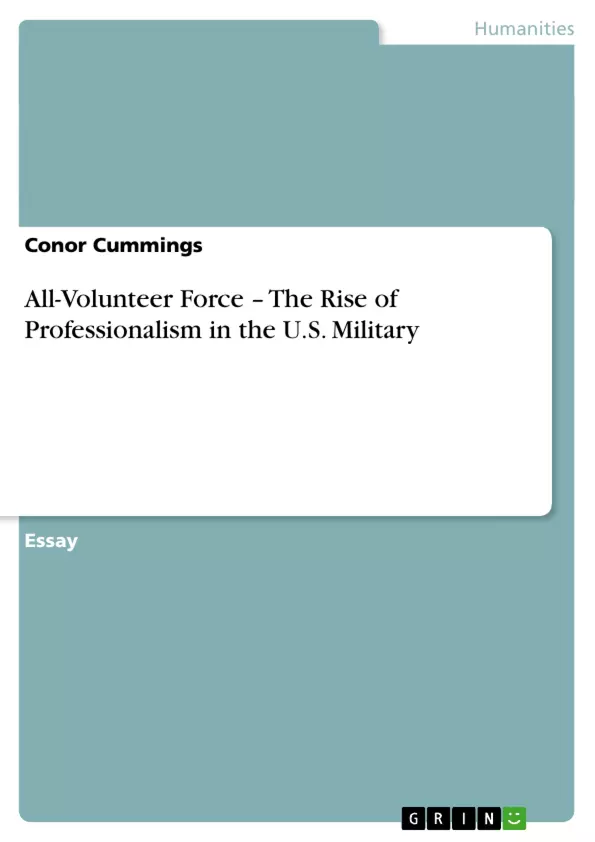In 1969 President Richard Nixon established the President’s Commission on the All-Volunteer Force, a 15-member commission chaired by former Secretary of Defense Thomas Gates, to "develop a comprehensive plan for eliminating conscription and moving to an all-volunteer force." After the Gates Commission recommended ending the draft, critics alleged the move to an all-volunteer force would negatively alter the concept of American citizenship by eliminating the connection between citizenship and military service. Even if a return to military conscription was politically possible, the draft ended for a myriad of legitimate military, political, and social reasons that make its re-establishment even less practical today. If Americans have lost a sense of civic obligation and community, the end of the draft did not create this problem, nor would the return of conscription serve as a panacea for problems with America’s civic and political culture.
Inhaltsverzeichnis (Table of Contents)
- The All-Volunteer Force: A Historical Perspective
- Myth of the Mercenary Army
- The All-Volunteer Force and Representation
- The Draft and the "Skin in the Game" Argument
Zielsetzung und Themenschwerpunkte (Objectives and Key Themes)
This paper examines the historical transition to an all-volunteer force in the United States military, addressing arguments for and against the end of military conscription. The main focus is on dispelling common myths surrounding the all-volunteer force, including the belief that it undermines civic duty, creates a mercenary army, or unfairly burdens certain segments of the population.- The historical evolution of military conscription in the United States
- The impact of the all-volunteer force on civic duty and patriotism
- The myth of the mercenary army and its implications for military service
- The debate surrounding the representation of diverse demographics in the all-volunteer force
- The argument for reintroducing conscription to increase public accountability and shared sacrifice during wartime
Zusammenfassung der Kapitel (Chapter Summaries)
The first chapter provides a historical overview of the U.S. military's reliance on both volunteers and conscription throughout its history. It traces the development of the all-volunteer force, highlighting the shift from a draft-based system to a purely volunteer model. The second chapter examines the argument that the all-volunteer force creates a mercenary army, lacking the patriotism and commitment of a draft-based force. It deconstructs the notion that conscripted soldiers are inherently more patriotic or dedicated to the nation's cause, challenging the common stereotype of the mercenary soldier. The third chapter addresses concerns regarding the representativeness of the all-volunteer force, exploring the issue of class and socioeconomic backgrounds of those who choose to enlist. It argues that the draft, despite often being perceived as a more equitable system, has historically resulted in a disproportionate representation of lower-income individuals and minorities. The fourth chapter analyzes the argument for reintroducing conscription, particularly the notion that it would increase public accountability and encourage shared sacrifice in times of war. The author contends that the draft would not necessarily make the government more cautious in deploying troops and could even lead to prolonged military engagements.Schlüsselwörter (Keywords)
This paper focuses on themes such as military service, conscription, all-volunteer force, civic duty, patriotism, representation, socioeconomic factors, public accountability, and the "skin in the game" argument. It examines the historical development of conscription in the United States and the societal and political implications of the transition to an all-volunteer force.Frequently Asked Questions
What is the "All-Volunteer Force" (AVF)?
The AVF refers to the U.S. military system established in 1973, where service is based on voluntary enlistment rather than conscription (the draft).
Why was the military draft ended in the United States?
President Nixon moved to an all-volunteer force due to a mix of military, political, and social reasons, including the unpopularity of the Vietnam War draft.
Does an all-volunteer force undermine civic duty?
Critics argue it weakens the link between citizenship and service, but proponents contend that professional volunteers are more effective and motivated.
Is the U.S. military a "mercenary army"?
The term is often used by critics, but the paper argues this is a myth, as volunteer soldiers are driven by patriotism and professional commitment, not just pay.
What is the "skin in the game" argument for the draft?
It suggests that if everyone's children were subject to the draft, the public would be more critical of the government's decisions to go to war.
- Quote paper
- Conor Cummings (Author), 2012, All-Volunteer Force – The Rise of Professionalism in the U.S. Military, Munich, GRIN Verlag, https://www.grin.com/document/210756



